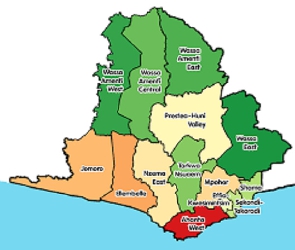The Bomba community is a neglected community in terms of potable water and health infrastructure. This community, which is located in the heart of the Mpohor district, has been struggling to access clean water for years.
The community is made up of hardworking individuals who are striving to make a living for themselves and their families. However, their efforts are often hindered by the lack of basic amenities such as clean water and proper health facilities.
For many years, the residents of Bomba have been forced to drink and use contaminated water from nearby streams and rivers. Drinking from these sources of water may lead to a high prevalence of water-borne diseases such as cholera, typhoid, and dysentery. Children are particularly vulnerable to these diseases, which often result in death or long-term health problems. The lack of access to clean water has also made it difficult for the community to maintain proper hygiene, which may further exacerbate the spread of diseases.
In addition to the lack of clean water, the community also lacks proper health facilities. The only health facility that served the community has become a death snag which has forced the health workers in the community to withdraw their services for safety.
This means that residents have to travel long distances to seek medical attention elsewhere, which can be difficult and expensive. This will result in a high mortality rate, especially among women and children.
The neglect of the Bomba community is a clear violation of their basic human rights. The right to clean water and proper health facilities is enshrined in the Universal Declaration of Human Rights, which states that everyone has the right to a standard of living adequate for the health and well-being of themselves and their families. The neglect of the Bomba community by the leadership of the district is a clear violation of this fundamental human right.
It is time for the leadership of the district to take action and provide the Bomba community with access to clean water and proper health facilities.
This in my view can be achieved through a combination of government intervention, community participation, and private-sector investment.
The government through the district assembly should prioritize the provision of basic amenities such as clean water and healthcare to marginalized communities like Bomba. This can be done through the allocation of resources particularly the mp common fund and the implementation of policies that prioritize the needs of these communities.
In conclusion, the neglect of the Bomba community in terms of portable water and health infrastructure is a clear violation of their basic human rights and a defilement of the millennium development goals 4 and 5. It is time for the authorities to take action and provide the community with access to clean water and proper health facilities.
The Bomba community deserves better, and it is time for the leadership at the helm of affairs in the district to act fast to salvage the treacherous situation of the people of Bomba.
Opinions of Friday, 28 April 2023
Columnist: Abeiku Cobbinah



















